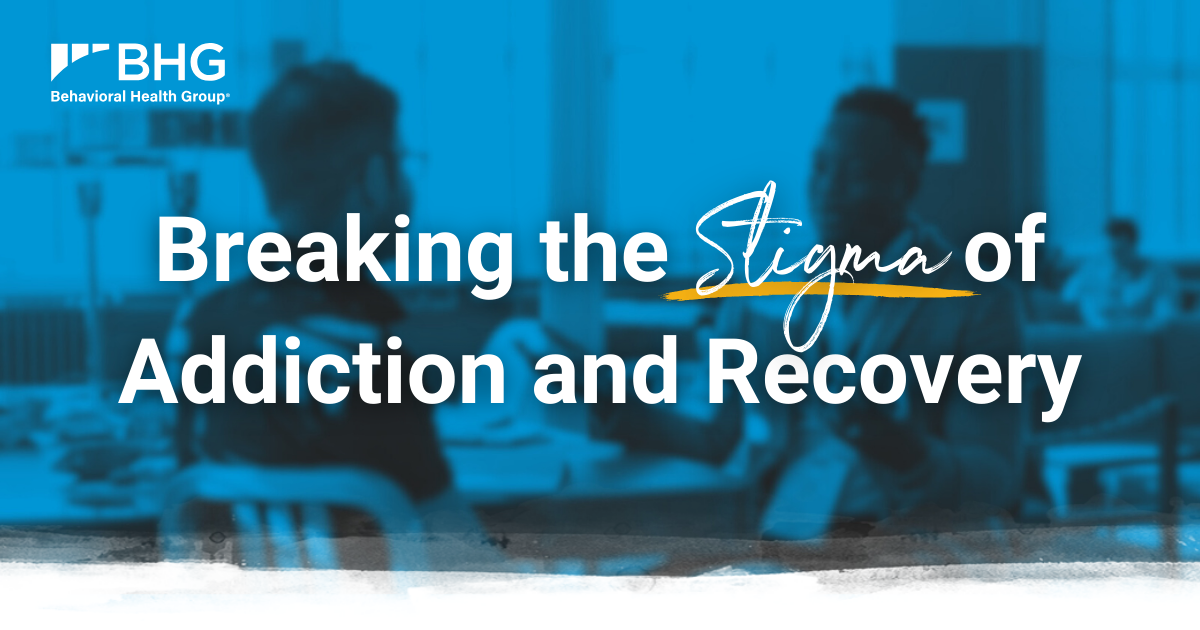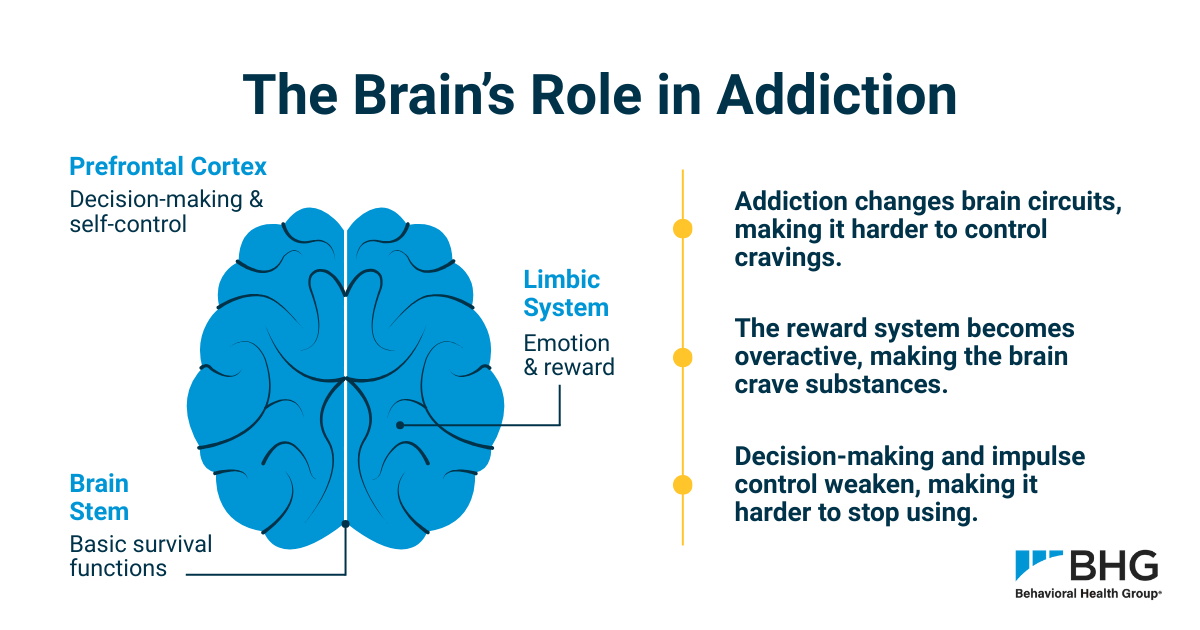
Addiction affects millions of people, but many still struggle with the fear of being judged when it comes to seeking help. The stigma of addiction often makes it harder for those who need help to find the support they deserve. The good news is that we can all play a part in breaking down these barriers. By having open conversations, using kind language and supporting recovery, we can help make addiction treatment more accessible and create a safer, stigma-free place for everyone.
To understand how we can break the stigma around addiction, let’s take a closer look at what addiction stigma is, how it affects people with substance use and how we can all help make recovery feel more supportive and positive.
Understanding the Stigma Around Addiction
Addiction stigma is still common, with many people believing it’s just about making bad choices or lacking willpower. But the reality is much more complicated. The word “addiction” can also be stigmatizing, which is why many people and healthcare providers say “substance use disorder” (SUD). In truth, addiction is a chronic disorder that affects the brain, changing areas that control decisions, self-control and emotions. These changes make it hard for someone to stop using substances on their own. It’s not as simple as just “deciding” to quit.
The Brain’s Role in Addiction
When someone has a SUD, it’s not just about behavior; it’s rooted in the brain. Drug use changes the brain's reward system, particularly the prefrontal cortex - which helps with self-control, decision-making and the limbic system (which controls emotions).
These changes make it hard to control cravings and impulses, which is why addiction isn’t just about making better choices; it’s a medical condition that requires support to overcome.

How Brain Changes Lead to Stigmatized Behaviors
The changes in the brain can cause behaviors that are misunderstood and contribute to addiction stigma. For example, someone with severe addiction may become aggressive, lie or steal to support their habit or cope with withdrawal.
While these behaviors come from the way addiction affects the brain and body, they’re frequently seen as moral failings or personal weaknesses. This misunderstanding fuels harmful stereotypes. Some people believe that people with addiction are criminals or dangerous.These false ideas add to the stigma and make it harder for people to get help.
How Stigma Hurts Those Seeking Help
The stigma around addiction causes real harm. When people fear being judged or rejected, they may avoid seeking the help they need. This can leave them feeling alone and ashamed. This stigma also affects treatment options, like Medication-Assisted Treatment (MAT), which many people don’t fully understand.

The Stigma and Myths Surrounding MAT Treatment
Medication-Assisted Treatment (MAT) is a powerful tool for those with opioid use disorder (OUD). It uses medications like buprenorphine, methadone, or naltrexone along with counseling to help people feel stable, manage cravings and lower the chance of relapse. Despite its proven effectiveness, MAT is still widely misunderstood.
One of the biggest myths is that MAT simply swaps one addiction for another. This idea has been around since the early days of methadone clinics, over 40 years ago, when people saw it as just replacing one drug with another. In reality, MAT isn’t about replacing addiction—it helps people feel stable and take back control of their lives. Another common myth is that MAT is an “easy shortcut” for those not fully committed to recovery. The truth is, MAT is an important part of a long-term recovery plan that requires real dedication and effort.
These misconceptions aren’t just harmless misunderstandings—they stop people from getting the help they need. When people believe these myths, it can cause them to avoid seeking MAT and think it’s not a real treatment option. Sadly, this stigma has been passed down for decades, from the early days of methadone clinics to the resistance still felt in some traditional recovery programs today.
How Stigma Hinders Access and Recovery
The stigma surrounding MAT isn’t just something experienced by individuals from family or friends; it can also be found among healthcare providers and addiction specialists. When MAT is misunderstood by professionals, it can lead to missed opportunities for patients who need treatment the most. Some counselors still believe that MAT is simply "substituting one drug for another," while others think it’s not a "real" form of recovery. Even some healthcare providers with outdated views may avoid recommending MAT or fail to educate their patients about it.

This stigma creates real barriers. People already dealing with opioid addiction may avoid MAT because they fear being judged or seen as not being truly committed to recovery. When this doubt is shared by loved ones or treatment providers, it makes it harder for individuals to get the help they need.
Overcoming these biases is important. MAT is one of the most effective tools in addiction recovery and ending the stigma around it will help more people get the support they deserve.
Breaking the Stigma Through Dialogue
Stigma isn’t just something people feel - it’s something they hear in everyday conversations, news stories and even in the way we talk about addiction treatment. These words and phrases can carry a lot of weight, often adding to shame without realizing it. However, there’s a way where we can all make a difference: by being more mindful of our language. How we talk about addiction shapes how it’s understood - and whether people feel safe asking for help.

The Power of Language: Using Non-Stigmatizing Words
One of the easiest ways we can help break the stigma of addiction is by simply changing the words we use. Words matter more than we think. The words we choose can either lift people up or keep them feeling stuck in shame.
For example, instead of calling someone an "addict," we can say "someone in recovery" or "a person living with substance use disorder." This way, we’re putting the focus on the person, not the problem. It’s about showing that addiction doesn’t define who they are.
Instead of saying addiction is a "moral failing," we can talk about it as a disease. This helps change the way people see addiction, making it clear that it’s not about lack of willpower but a medical condition that deserves compassion, not judgment.
Changing our language might feel small, but it has a powerful impact. Here’s a quick reference guide of words to avoid and compassionate alternatives you can use instead:
| Instead of... | Use... |
| Addict or user | Someone in recovery or person living with substance use disorder |
| Junkie | Person in active use |
| Former addict | Person in recovery or long-term recovery |
| Clean | Testing negative |
| Abuse |
For illegal substances - Use For prescriptions - Misuse or used other than prescribed |
You can check out more person-first, non-stigmatizing language recommendations on the National Institute on Drug Abuse’s website.
Starting the Conversation: How to Encourage Open Dialogue
Breaking the stigma around addiction isn’t just about changing our words — it’s about changing how we talk about addiction. Creating a space where people feel comfortable talking about addiction is key to helping those in recovery.
Here are some ways we can all help start these important conversations:
1. Listen Without Judging
One of the best things you can do is simply listen. When someone shares their struggles with substance use disorder (SUD), they need to know they are being heard, not judged. By listening with kindness, we make it easier for them to talk openly without feeling like they’re going to be criticized or blamed.
2. Make Addiction a Normal Topic
Addiction is far more common than we think, yet we rarely talk about it openly. Let’s change that. By bringing addiction into everyday conversations, we make it easier for people to ask for help when they need it.
3. Educate Yourself and Others
The more we know, the less we judge. Addiction is a complicated illness and it’s important to understand what’s really going on. When we educate ourselves about the science of addiction — how it affects the brain, how treatment works and how recovery is possible — we become better equipped to support those in need.
4. Share Stories of Recovery
There’s power in sharing stories - they offer hope, reduce stigma and remind others that recovery is possible. But every journey is personal and not everyone is ready to share theirs - and that’s okay. Those who feel called to share their personal stories of recovery from opioid use disorder (OUD) or substance use disorder (SUD) help others see that they’re not alone. Whether it’s a few words with a friend or a more public story, what matters is that it comes from a place of choice and strength.
5. Create Supportive Communities
Support is key in any recovery process. Whether it’s family, friends or a larger community, having a group of people who are there to offer encouragement and understanding makes all the difference. Being part of a supportive group helps people feel like they’re not alone and it can motivate them to keep going.

How Families and Communities Can Help Break the Stigma of Addiction
Families and communities have a special role in helping break the stigma of addiction. They’re often the first line of support for someone in recovery. Here’s how you can help:
1. Show Compassion and Patience
Recovery is not an overnight process. There will be ups and downs. Families and communities can show support by being patient and understanding. Offer encouragement and let them know they are loved no matter what.
2. Encourage Professional Treatment
While love and support are important, professional treatment is needed for long-term recovery from opioid use disorder (OUD). Encourage your loved one to seek therapy, counseling or other programs if they haven’t already. These resources give them the tools and structure they need to heal.
3. Celebrate the Small Wins
Recovery happens in small steps and each one deserves to be celebrated. Whether it’s a day or a month of progress, acknowledging those milestones boosts confidence and motivation. Celebrating recovery milestones makes people feel proud of their achievements and reminds them that they’re on the right path.

Moving Forward with Empathy
Breaking the stigma around treatment requires all of us to come together. By using respectful language, supporting open conversations and building compassionate communities, we can create a world where addiction is seen for what it really is — a disease that deserves treatment, understanding and support.
So, let’s start today. Let’s listen, educate, share stories and offer support to those in recovery. Together, we can break the stigma of addiction, one conversation at a time.
Breaking the Stigma and Supporting Your Loved One's Journey at BHG
At Behavioral Health Group (BHG), we know that recovery is more than a treatment plan - it’s a journey that begins with empathy, understanding and support. Every day, our dedicated staff and care teams help break the stigma around substance use disorder by creating safe spaces for open conversations and offering judgement-free care for those affected by opioid use disorder (OUD).
Our comprehensive and compassionate approach to treating OUD combines FDA-approved Medications for Opioid Use Disorder (MOUD), individual or group counseling, case management, peer support and other wraparound services.
If you or someone you know is ready to take the next step, we’re here to guide you through it. Find a BHG treatment center near you or call 844-535-7291. Referral partners and healthcare providers can reach our dedicated referral line at 866-763-2244 or submit an online referral form through our website.
